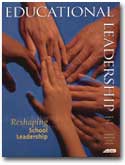Personal and social competencies. Collaboration skills. Reculturing capacities. There is a revolution in school leadership today. What do educators think about shared decision making? How can teachers, administrators, and students work together to engage everyone in learning? Here are Web sites that point to some answers—and more questions.
Canadian Innovations
http://irwin.city.swift-current.sk.ca/irmain.htm. Witness a sea change in leadership in Canada, or at least a shift in Swift Current, Saskatchewan, where students are "tour guides and conference presenters" on technology issues, as teachers, students, and administrators share leadership. Irwin Middle School Principal Dianne L. Yee wrote about their technology project, "Chalk, Chips, and Children" (p. 57). Student input is evident on the charming Web pages for both Irwin and the school district. Note: At Yee's home away from home, the University of Calgary, "There is a revolution" is the title of the university's new Master in Teaching program (see http://external.educ.ucalgary.ca/).
http://edu.oise.utoronto.ca/depts/tps/edadmin/iceco/iceco.html. Michael Fullan, in "Breaking the Bonds of Dependency" (p. 6), says: "Reculturing involves changing the norms, values, incentives, skills, and relationships in the organization to foster a different way of working together." This site, the International Centre for Educational Change at the University of Toronto, is creating networks, collaboratives, and other initiatives. Check out "Networks," an online forum for teachers (http://gateway.oise.utoronto.ca/wwwgate/Teacher_Research_EJ/).
Research Help
http://www.ncrel.org/sdrs/. Pathways to School Improvement has many avenues. Its codirector, Bruce Wellman, coauthored (with Robert Garmston) the article "Teacher Talk That Makes a Difference" (p. 30). Take the "Trip Planner Inventory" in the Leadership section to help you analyze your own school or classroom. This site is sponsored by the North Central Educational Laboratory.
http://www.ed.gov/stats.html. At the recently redesigned U.S. Department of Education Web site, this page links you to National Center for Education Statistics surveys, such as the Schools and Staffing Surveys analyzed by Jianping Shen in "Do Teachers Feel Empowered?" (p. 35). Also, scroll down this "stats" page to "Search ERIC"—a bibliographic database of 900,000+ research articles, reports, conference papers, and instructional materials.
http://www.temple.edu/LSS/csr_info.htm. Margaret Wang and colleagues at the Mid-Atlantic Regional Educational Laboratory at Temple University have posted an extensive examination of research-based educational programs at this site. Note: Acrobat format required for viewing. See their article, "Models of Reform," in this issue (p. 66).
Building Capacity for Change
http://www.aisr.brown.edu/html/builproj.html. Are you a member of a "Critical Friends Group"? At the Annenberg Institute for School Reform, one project aims to build capacity for teachers and administrators to collaborate in ways to increase student achievement. Nancy Mohr, in "Learning Through Principal Study Groups" (p. 41), describes some of her work with an Institute program.
http://www.rci.rutgers.edu/~gsapp/consortium.htm. The Consortium for the Promotion of Personal and Social Competence at the Workplace—be it office, factory, or school—emphasizes the five dimensions of emotional intelligence: self-monitoring, self-regulation, motivation, empathy, and social skills. Author Gary Cherniss ("Social and Emotional Learning for Leaders," p. 26), cochair of the Consortium, says that educational leaders need "people skills" more than ever.
http://161.7.114.15/OPI/opi.html. At the Montana Office of Public Instruction, download information about an important element of the state's accreditation process, the "Performance-Based Alternative Manual," as well as Montana's accreditation standards. Authors Janice Clinard and Lenoar Foster describe the process in "Leadership in a Fishbowl" (p. 53).
Web Safety Tips
A reader writes: Keeping our teachers and children safe while they explore the Internet is a high priority for any of us who contribute to Internet-based learning. I have a concern regarding information about minor students that may be directly or indirectly contained in teachers' pages. As we reviewed school-based Web sites while developing our district's Acceptable Use Policy, our committee found many examples of well-intentioned education pages containing information about minor students that could jeopardize the future safety of the student or potentially entangle teachers in liability issues. Our legal counsel warned against identifying students through the inclusion of photographs or student e-mail without expressed written permission from the student's parent or legal guardian.
—Contributed by George Viebranz (gviebran@bw.edu), Curriculum Coordinator for Instructional Technology, Berea City School District, and Instructor of Educational Technology, Baldwin-Wallace College, Berea, OH.
